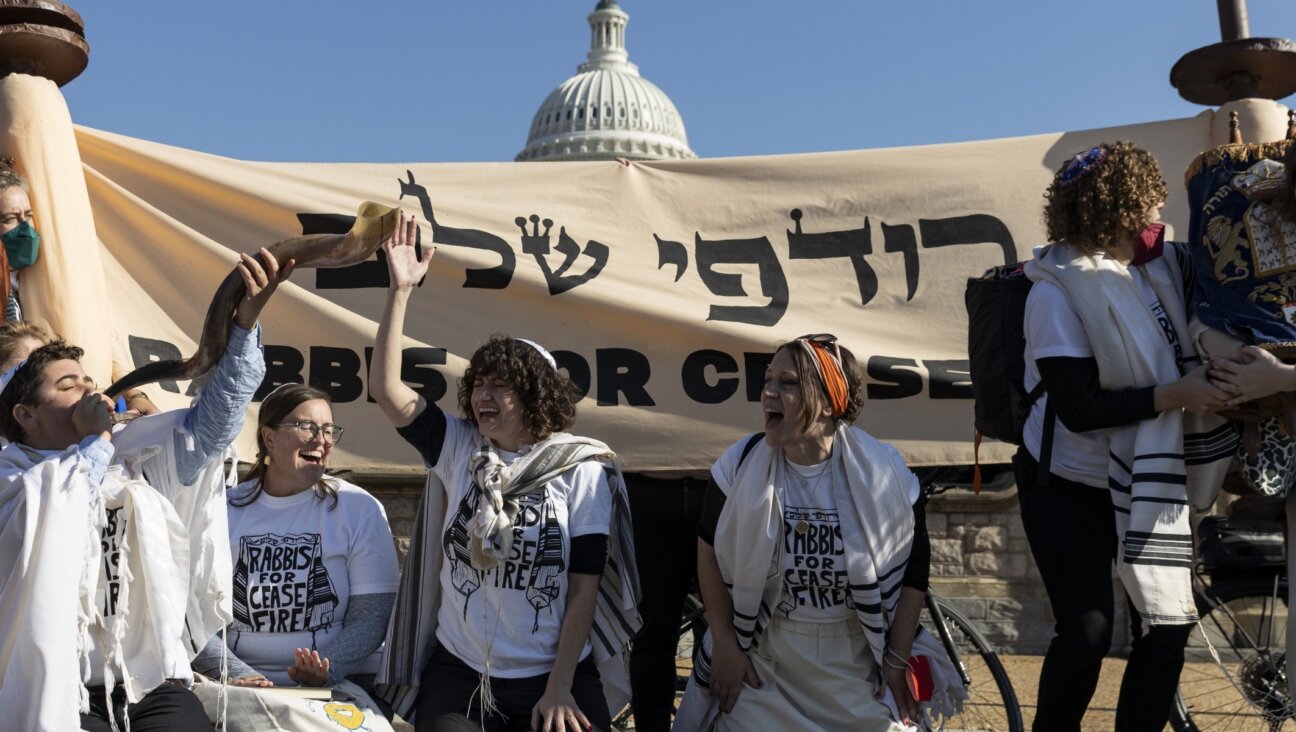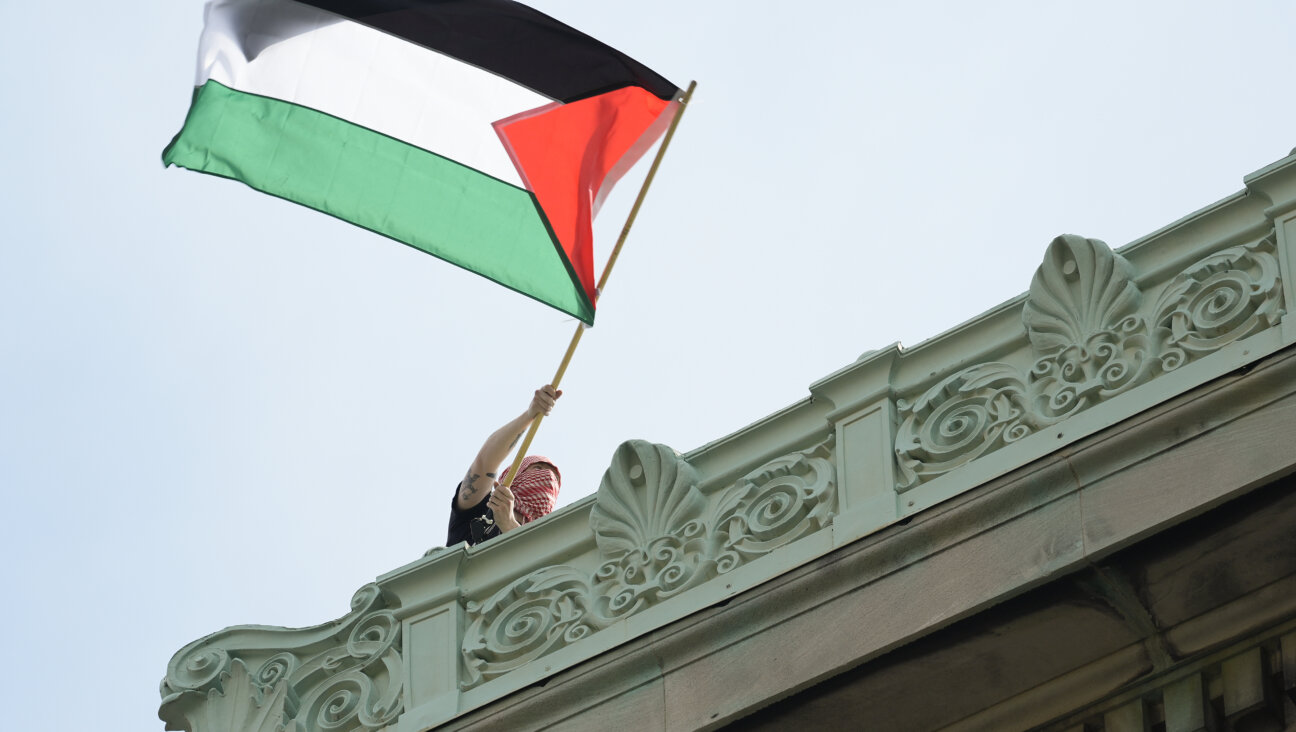Rabbi Lauds Bahrain King Despite Abuses

Crackdown King: Rabbi Marc Schneier meets Bahrain?s King Hamad bin Isa Al Khalifa. The Gulf State?s ruler has been criticized for cracking down on opponents but Schneier praises him as a model of interfaith dialogue.
Prominent New York Rabbi Marc Schneier has returned from the Bahrain claiming a major advance in Jewish dialogue with Islam: a promise by the Gulf state’s ruler to convene a first ever meeting of religious leaders from both faiths in the kingdom.
Schneier, president of the Foundation for Ethnic Understanding, returned from his trip on December 29, full of praise for King Hamad bin Isa Al Khalifa’s religious tolerance and acceptance.

Rabbi Marc Schneier Image by getty images
“Bahrain is a role model in the Arab world for coexistence and tolerance of different faith communities, including a small Jewish community,” he said in a statement on his return. “I am excited that he and his government are fully committed to building bridges between our two communities.”
Schneier’s praise for the country and its monarch, specifically for its fostering of religious coexistence, appeared to contrast sharply with the strife that has engulfed the small Persian Gulf kingdom since the Arab Spring arrived at its shores.
Staring in February, in largely nonviolent demonstrations, members of Bahrain’s Muslim Shiite majority, along with some Sunni allies, have been protesting the discrimination they experience under the rule of the Sunni Muslim ruling family. The government has crushed them brutally, by all accounts, including a study commissioned by the Bahrain government itself.
Schneier rejected the notion that the openness demonstrated by the Bahraini monarch could be an attempt to win over the sympathy of American Jews at a time when international support for his action is in decline. The New York rabbi explained that dealing with Bahrain’s internal strife was not part of his mission and that he was focused solely on the issue of Jewish-Muslim dialogue. “I was somewhat myopic in my goals over there,” he conceded.
“This wasn’t a fact-finding mission for me,” he added. “I came with a very focused mission and, thank God, I was able to accomplish it.”
Reports by human rights groups and by the government’s own Independent Commission of Inquiry have found that government forces abused and tortured hundreds of protesters, leading to the death of at least 35 of them. Nearly 3,000 people have been detained, including 20 Bahraini doctors and nurses who treated activists wounded during the anti-government protests. A military court handed out sentences to these medical personnel ranging from five to 15 years. At least 700 remain in prison, according to the Independent Commission of Inquiry’s report.
Schneier’s mission was, to a great extent, unprecedented. While Jewish–Muslim dialogue forums are common in the U.S. and Europe, he succeeded in recruiting King Hamed to host such a meeting in a Muslim country. At the end of the 45-minute meeting, which took place in the royal palace in Manama, an agreement was reached to hold a meeting in 2012 in which 10 Jewish and 10 Muslim leaders will convene to discuss relations between the two faiths in Bahrain under the auspices of King Hamed.
“I see this as a natural extension of the journey we’ve been on to strengthen relations between Jews and Muslims,” said Schneier, who also serves as vice president of the World Jewish Congress.
Bahrain, a tiny Gulf island with a population of 1.2 million is home for the Navy Fifth Fleet and is considered a close U.S. ally. While the majority of its population is Shiite, the nation is ruled by the Sunni minority.
Bahrain has a tiny Jewish community with some 30 members. One of them, Houda Ezra Nonoo, serves as the country’s ambassador to the United States. Schneier said he chose Bahrain as a potential host of an interfaith dialogue because of its tradition of religious tolerance, which is demonstrated by its attitude toward the island’s Jewish residents.
In his conversation with Schneier, the Bahraini ruler highlighted the reforms he intends to implement in the kingdom and said that he himself decided to set up the independent inquiry committee that found that several individuals had exceeded their authority in using force against protesters.
King Hamad also underlined Bahrain’ narrative of the past year’s events, which holds Iran responsible for the unrest in the country, presumably because of its wish to see the nation under Shiite rule. His own government appointed commission found no proof of such a link.
Schneier said he left the palace convinced that King Hamad is sincere in his wish to reform the country. He also seemed to take seriously the argument that “Iran has their hands all over” the attempted revolution, adding that this could perhaps serve as another bridge between the American Jewish community and Bahrain since “we share a common enemy.”
Contact Nathan Guttman at [email protected]

I hope you appreciated this article. Before you go, I’d like to ask you to please support the Forward’s award-winning, nonprofit journalism during this critical time.
Now more than ever, American Jews need independent news they can trust, with reporting driven by truth, not ideology. We serve you, not any ideological agenda.
At a time when other newsrooms are closing or cutting back, the Forward has removed its paywall and invested additional resources to report on the ground from Israel and around the U.S. on the impact of the war, rising antisemitism and the protests on college campuses.
Readers like you make it all possible. Support our work by becoming a Forward Member and connect with our journalism and your community.
Make a gift of any size and become a Forward member today. You’ll support our mission to tell the American Jewish story fully and fairly.
— Rachel Fishman Feddersen, Publisher and CEO
Join our mission to tell the Jewish story fully and fairly.























